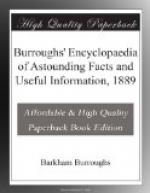and machines. Sometimes 25, 30, 40 and even 50
per cent. of your power is consumed through lack of
good oil. When you buy a water wheel, be sure
to buy one small enough to run at full gate while
the stream is low during the summer months. If
you want more power than the small wheel will give,
then put in two or more wheels of various sizes.
When it becomes necessary to trim a piece of rubber,
it will be found that the knife will cut much more
readily if dipped in water. When forging a chisel
or other cutting tool, never upset the end of the
tool. If necessary cut it off, but don’t
try to force it back into a good cutting edge.
In tubular boilers the handholes should be often opened,
and all collections removed from over the fire.
When boilers are fed in front, and are blown off through
the same pipe, the collection of mud or sediment in
the rear end should be often removed. Nearly all
smoke may be consumed without special apparatus, by
attending with a little common sense to a few simple
rules. Suppose we have a battery of boilers, and
“soft coal” is the fuel. Go to the
first boiler, shut the damper nearly up, and fire
up one-half of the furnace, close the door, open damper,
and go to the next boiler and repeat the firing.
By this method nearly, if not quite, all the smoke
will be consumed. A coiled spring inserted between
engine and machinery is highly beneficial where extreme
regularity of power is required. It is well known
that a steam engine, in order to govern itself, must
run too fast and too slow in order to close or open
its valves; hence an irregularity of power is unavoidable.
A “Paste” Metal Polish for Cleaning and
Polishing Brass.—Oxalic acid 1 part, iron
peroxide 15 parts, powdered rottenstone 20 parts, palm
oil 60 parts, petrolatum 4 parts. See that solids
are thoroughly pulverized and sifted, then add and
thoroughly incorporate oil and petrolatum.
Cough Candy or Troches.—Tincture of squills
2 ounces, camphorated tincture of opium and tincture
of tolu of each 1/4 ounce, wine of ipecac 1/2 ounce,
oil of gautheria 4 drops, sassafras 3 drops, and of
anise seed oil 2 drops. The above mixture is to
be put into 5 pounds of candy which is just ready
to take from the fire; continue the boiling a little
longer, so as to form into sticks.
How to Oxidize Silver.—For this purpose
a pint of sulphide of potassium, made by intimately
mixing and heating together 2 parts of thoroughly
dried potash and 1 part of sulphur powder, is used.
Dissolve 2 to 3 drachms of this compound in 1-3/4 pints
of water, and bring the liquid to a temperature of
from 155 degrees to 175 degrees Fah., when it is ready
for use. Silver objects, previously freed from
dust and grease with soda lye and thorough rinsing
in water, plunged into this bath are instantly covered
with an iridescent film of silver sulphide, which
in a few seconds more becomes blue black. The
objects are then removed, rinsed off in plenty of
fresh water, scratch brushed, and if necessary polished.




